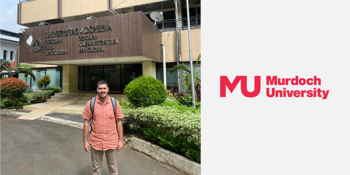Tyler Glands was a participant in the 2023 Development Studies Professional Practicum from Murdoch University. Tyler is studying a Bachelor of Global Security. Tyler received a $3000 New Colombo Plan mobility grant to support his participation on this program.
Q: Why did you decide to undertake the ACICIS internship program?
I decided to take this Internship as it was an excellent opportunity to better my understanding of security studies, build networks, and see the world.
Q: Did you receive a New Colombo Plan Mobility Grant? Do you think the NCP is an important initiative? If yes, why? The NCP is a signature initiative of the Australian Government which aims to lift knowledge of the Indo-Pacific in Australia by supporting Australian undergraduates on experiences such as the Professional Practica.
I received the new Colombo mobility grant which made it extremely more easier to accept this internship. As a university student, money is a bit scarce so to the grant definitely helps a lot.
Q: Where did you live in Indonesia (Kos, homestay, hotel, rental etc.)? Any tips for prospective students on finding accommodation?
I lived in South Jakarta at the Green Bamboo residence during the first 2 weeks then moved into Ibis hotel senen in central Jakarta for the 4 week internship. My advise in finding accommodation is ask around, interact with other students/friends in order to help each other, find what suits you.
Q: How have you found the academic components of this program – i.e. the language classes/seminars?
The academic components were very engaging which is good for a student like me who can get distracted pretty easy. The language classes were really fun and encouraging which was good considering I hadn’t learned a language before. The seminars and field trips were excellent as they provide you with much need knowledge on the country.
Q: What organisation are you interning with? (Explain your role and responsibilities)
PRIK-KT – I am interning at the research centre for police science and terrorism studies. My roles include researching, field work (interactions with form radicals), and exchanging thoughts.
Q: How have you found the work culture of your host organisation? How is it different to work experience in Australia?
The culture is quite similar in terms of work culture in Australia as they are all dedicated to making a difference in their field of work.
Q: What are the main skills you have learnt during your internship?
I have improved my communication, research, and time management skills.
Q: What did you find to be the most rewarding part of this experience?
The most rewarding part of the experience was being able to listen and understand the stories of locals who have been affected by radicalisation and how the deradicalisation programs have saved there lives.
Q: Were you able to learn about the Indonesian culture from this program? If yes, how was this achieved?
Yes, being able to study in 2 different university campuses has allowed me to experience the culture of Indonesia.
Q: How will the internship benefit or influence your future career?
The internship has benefited me, as I have built strong networks and gained experience that most people don’t have.
Q: Would you recommend this program to your friends?
I recommend this program to everyone, even if you are sceptical of living overseas, just jump out of your comfort zone and take the opportunity.
Q: Favourite Indonesian word/phrase:
Sedikit Pedas – Much needed phrase when ordering food (little bit spicy)


